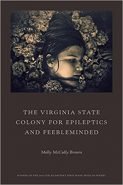
Book Review: Let Dead Girls Speak
Reviewed by Gillian Neimark

The Virginia State Colony for Epileptics and Feebleminded
Poetry by Molly McCully Brown
Persea Books, March 2017
80 pages, $15.95
ISBN-13 978-0-89255-478-2

Thrust
Poetry by Heather Derr-Smith
Persea Books, Oct. 2017
96 pages, $15.95
ISBN-13: 978-0892554867
“A dead girl can kick a movie into gear,” writes poet Kim Addonizio, in what is this thing called love, “better than a salon brawl, better / than a factory explosion.” The most memorable dead girl of post-confessional poetry lies decaying in the woods in Frank Bidart’s chilling masterpiece “Herbert White.” The narrator—a serial killer, pedophile, and necrophiliac—hits a girl on the head: “it was good / and then I did it to her a couple of times.” He deposits her body in the woods after raping her, yet is drawn back time and again. He even jumps out of the car, leaving his family for a few minutes, to masturbate over her.
When the body got too discomposed,
I’d just jack off, letting it fall on her…
—It sounds crazy, but I tell you
sometimes it was beautiful—; I don’t know how
to say it, but for a minute, everything was possible—;
As she decomposes, “more and more of the skull” shows through. Herbert White notices that “the nights became clearer, and the buds,—erect, like nipples . . .” The poet’s eye slips in and gifts his monster with an erotic clarity that such monsters likely don’t possess in real life.
Whenever I read this poem, I want an antidote. Herbert White is most disrupting when poet and murderer become one, speaking in the same expulsive voice: “I wanted to see beneath it, cut / beneath it, and make it / somehow, come alive . . .” It is not a sanitization, exactly—after all, the narrator ends up in a hell of self-loathing. But it stands in a long line of dead-girl begats, if I can call them that, where eros erupts from the demolishment of women.
In the time of #metoo that Harvey Weinstein ushered in, a time when everything from Balthus’ Therese Dreaming to the standards for The Paris Review are being reevaluated, it’s utterly bracing to find two new books of poetry by women that let the girls speak—speak like Cassandra, speak like Scheherazade, and by speaking, not die.
Curiously, both are by women poets rooted in a sense of place—and that place is Virginia, where they grew up—its woods, rivers, and fields. The first, Molly McCully-Brown’s The Virginia State Colony for Epileptics and Feebleminded, gives a steady, unapologetic, almost liturgical voice to fictive priests, caregivers, and patients from a century ago in a real-life residential hospital in Virginia that housed and sterilized thousands of patients. It’s a quiet knockout of a book in which the voices of the broken, deformed girls are unforgettable.
In the opening poem, “The Central Virginia Training Center” Brown refers obliquely to her own real-life cerebral palsy, describing her “spastic, palsied and off-balance” body, which by “an accident of luck or grace” escaped a place that could have imprisoned her a half century earlier. But her body has brought her close enough to feel what it must have been like: “I’m taking crooked notes about this place . . . I am my own kind of damaged there.” From those notes flow girls whose voices exhume and empower them. They have been sterilized, adding worthlessness to worthlessness:
I will remember this day as the day
I was cleaved from my body.
Whatever they did, I am
the silt that slips between your fingers
when you dredge for the bright things
at the bottom of a pond.
These are girls (never women) defined by uselessness, since their wrecked bodies cannot reproduce—“useless approximations of live things, littered on the beds” and “a useless barge lit up, bearing away on the water.” They can, merely by their existence, destroy faith: “we are a whole host of reasons / to stop believing in anything.” But they also move like a stately procession of quiet Furies through Brown’s clear, cadenced lines—and miraculously reclaim life. These girls are perfectly capable of describing unspeakable acts of abuse and molestation. In the boarded up “blindroom” where one can be left tied up for days:
Sometimes, someone follows you in,
Puts his hands around your throat.
But we are not abandoned there, with the brute act—a man who is “hot and oversweet above you.” A crack in the window boards lets in a sliver of light, just enough for redemption, starting with each finger of an illumined hand:
…think
about each finger & think
about the sky until
it happened.
Think about your body.
Think about infinity.
Think about God.
The blindroom is “the worst place you’ve ever been” and is also “the world before God made it.”
These are girls who can transubstantiate, who while tied up on floorboards and raped in a boarded-up room can touch infinity and God. It is an extraordinary act of rehabilitation.
As spare and compassionate as Brown’s voice is, Heather Derr-Smith’s poems in Thrust uncoil wildly from the page like Medusa hair. The title of this book is a declamation and an act of possession. Here, too, violence against women is transformed into song, transubstantiated into love. These girls—who are punched, raped, terrorized, left for dead—never truly submit:
One boy pushed her down in the honeysuckle
And tried to fuck her, but she punched him off, jab
to the neck, her palm facing the ground.
And then moments later, transformation:
The girl’s hair lifted like veins—
not biblical, not evangelical, but something primitive
and voodoo, Made of stardust. Made of dirt.
Made of slut.
Derr-Smith’s poesy is lush, in-love, often lapidary, and deeply unafraid. Her book is replete with “the punch that breaks the jaw in piece / the hit that leaves you speechless”; the girl who is “hit again when she ducks. / So her dad kicks her down the hall.” And she offers the battered girl’s timeless conflation of hurt with love: “I know one thing. / I was worth beating down, a pulp. Someone wanted me so damn bad.”
In Derr-Smith’s woods, dead girls are not merely erotic and decomposing mannequins. They give rise to pink teeth and vexing questions:
When I left my father’s house I came to the place where the girls were found:
Pink teeth, indicate possible violence, quick oxidation of hemoglobin
or possible strangulation
remains found near water, no obvious taste of salt.
That’s what they said: no obvious taste. What I want to know is
…………………………………………who tasted?
The query—with its tinge of appalled disbelief—seems a line that only a woman would need, and be willing, to ask. The reader inevitably pauses uneasily after that question—and in that pause is writ a whole history of misogyny and its sanitization.
But violence is the beginning of reclamation. An “esophageal tunnel of woods” prefigures the transformation of the female walking in them. She hears “the wilderness ad libbing its prayers in the whippoorwill and the cypress.” She answers with her own song: “Ad libitum, according to my desire.” That song is a psalm to “the you that sprang from my guts every time I was hit or kicked / green bruises like the leaves in the boughs / The you of my being I imagined beautiful out of the penetralia / of that molt self.” She rises “from the blows, / like the ring of a bell, unbreakable.” She is: “phantasmagorical, huge, oracle” and veers “away from danger / in a sudden thrust of beauty.”
The thrust is hers, and the beauty is everywhere. It is in the hymnal choir of her language—“spangled with moss and the acapella of crickets.” It flows in delicious homages to boys, their “bodies of pure delight” and “the boys, the boys / swinging like a pendulum in the blooms.” It is evident in the speaker’s own desire, which reduces her to an “awestruck thing at the steps / of your pelvis.” She is as vulnerable as any woman, but she claims it in the name of love: her body and her eye are a “hymen” that is “lancinated” by a man’s beauty. She becomes supernatural, her bones artillery: “The woman levitated over Barcelona / She had a rifle for a clavicle.”
It is a riven world, where a boy can promise “I’m here for you” and yet one’s own father can call at three a.m.: “You slut, you’re a slut just like your mother.” But she embraces it all:
The morning before I met you,
…………………………………………a homeless man followed me down the street
saying, Come here you cunt. I’m going to kill you.
……………………………………….But when you asked me how I was,
I said good, like God in the beginning declaring all things good
“it was good” says Herbert White of hitting a girl on the head. “I said good,” counters Derr-Smith’s narrator, anointing the world. White’s “good” is built on a desire to annihilate that is writ into the entire history of our species. Derr-Smith’s “good” is full of supernumerary blessing, so vast it likens itself to the divine. It is, indeed, the necessary antidote at the right time.
Neither of these books seek retribution, unlike Sylvia Plath’s Lady Lazarus, who eats men like air. Instead, they fashion wholeness from (and in spite of) a fabric of daily transgression and harm. From both poets, these are necessary gifts in a time of reckoning for women everywhere.
Gillian (Jill) Neimark is an author of adult and children’s fiction and nonfiction. A former contributing editor at Discover Magazine, she has also written for Scientific American, Science, Nautilus, Aeon, The New York Times, NPR, Quartz, and Psychology Today. Her novel, Bloodsong, was published in hardcover in 1993 and paperback in 1994, was a BOMC selection, translated into Italian, German and Hebrew, and optioned for film. She is the author of three picture books and two middle-grade novels, and her poetry has been published in the Cimmarron Review, Borderlands, the Massachusetts Review, and the Columbia Review.

Leave a Reply